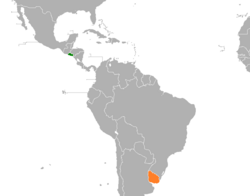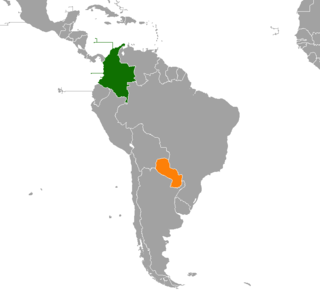
Colombia–Paraguay relations refers to the diplomatic relations between the Republic of Colombia and the Republic of Paraguay. Both nations are members of the Community of Latin American and Caribbean States, Latin American Integration Association, Organization of American States, Organization of Ibero-American States and the United Nations.

The nations of Mexico and Uruguay established diplomatic relations in 1831. Both nations are members of the Community of Latin American and Caribbean States, Latin American Integration Association, Organization of American States, Organization of Ibero-American States and the United Nations.

Peru–Uruguay relations are the diplomatic relations between the Republic of Peru and the Oriental Republic of Uruguay. Both nations are members of the Cairns Group, Community of Latin American and Caribbean States, Group of 77, Latin American Integration Association, Organization of American States, Organization of Ibero-American States and the United Nations.

The nations of Mexico and Paraguay established diplomatic relations in 1831. Both countries are full members of the Community of Latin American and Caribbean States, Latin American Integration Association, Organization of American States, Organization of Ibero-American States and the United Nations.
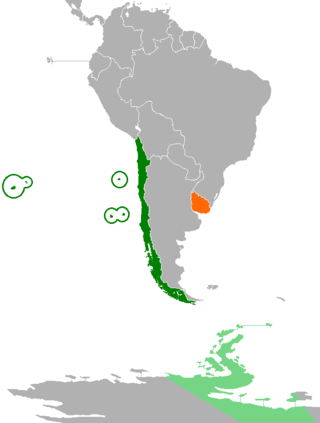
Chile–Uruguay relations are the current and historical relations between the Republic of Chile and the Oriental Republic of Uruguay. Both nations are members of the Cairns Group, Community of Latin American and Caribbean States, Group of 77, Latin American Integration Association, Organization of American States, Organization of Ibero-American States and the United Nations.

Spain–Uruguay relations are the current and historical relations between Spain and Uruguay. There is community of 67,000 Spanish nationals residing in Uruguay and 33,000 Uruguayan nationals residing in Spain. Both nations are members of the Association of Spanish Language Academies, Organization of Ibero-American States and the United Nations.

Diplomatic relations between the Argentine Republic and the Republic of El Salvador have existed for over a century. Both nations are members of the Community of Latin American and Caribbean States, Group of 77, Organization of American States, Organization of Ibero-American States and the United Nations.

Bolivia–Uruguay relations refers to the diplomatic relations between the Plurinational State of Bolivia and the Oriental Republic of Uruguay. Both nations are members of the Cairns Group, Community of Latin American and Caribbean States, Group of 77, Latin American Integration Association, Organization of American States, Organization of Ibero-American States and the United Nations.

Colombia–Uruguay relations refers to the diplomatic relations between the Republic of Colombia and the Oriental Republic of Uruguay. Both nations are members of the Cairns Group, Community of Latin American and Caribbean States, Group of 77, Latin American Integration Association, Organization of American States, Organization of Ibero-American States and the United Nations.

Cuba–Uruguay relations refers to the diplomatic relations between the Republic of Cuba and the Oriental Republic of Uruguay. Both nations are members of the Community of Latin American and Caribbean States, Group of 77, Organization of Ibero-American States and the United Nations.

Costa Rica–Uruguay relations refers to the diplomatic relations between Costa Rica and Uruguay. Both nations are members of the Community of Latin American and Caribbean States, Group of 77, Organization of American States, Organization of Ibero-American States and the United Nations.

Portugal–Uruguay relations refers to the current and historical relations between Portugal and Uruguay. Both nations are members of the Organization of Ibero-American States and the United Nations.
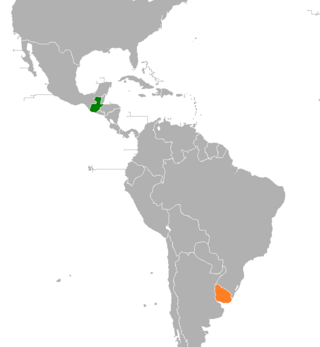
Guatemala and Uruguay have long-standing diplomatic relations. Both nations are members of the Community of Latin American and Caribbean States, Group of 77, Organization of American States, Organization of Ibero-American States and the United Nations.
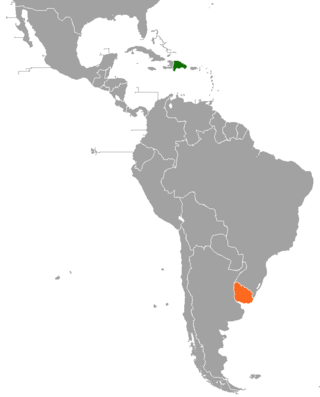
Dominican Republic–Uruguay relations refers to the diplomatic relations between the Dominican Republic and the Oriental Republic of Uruguay. Both nations are members of the Community of Latin American and Caribbean States, Group of 77, Organization of American States, Organization of Ibero-American States and the United Nations.

The Republic of Honduras and the Oriental Republic of Uruguay have long-standing bilateral and historical relations. Both nations are members of the Community of Latin American and Caribbean States, Group of 77, Organization of American States, Organization of Ibero-American States and the United Nations.

The nations of El Salvador and Mexico established diplomatic relations in 1838. Both nations are members of the Association of Caribbean States, Community of Latin American and Caribbean States, Organization of American States, Organization of Ibero-American States and the United Nations.

Nicaragua–Uruguay relations are the diplomatic relations between the Republic of Nicaragua and the Oriental Republic of Uruguay. Both nations are members of the Community of Latin American and Caribbean States, Group of 77, Organization of American States, Organization of Ibero-American States and the United Nations.

El Salvador and Spain have long-standing cultural and diplomatic relations, owing to the history of the Spanish Empire. Bilateral relations between the two as sovereign states began in 1865. Both nations are members of the Association of Academies of the Spanish Language, Organization of Ibero-American States and the United Nations.

El Salvador and Peru share a common history in the fact that both nations were once part of the Spanish Empire. Formal diplomatic relations were established in 1857. Both nations are members of the Community of Latin American and Caribbean States, Group of 77, Organization of American States, Organization of Ibero-American States and the United Nations.

El Salvador and France have maintained diplomatic relations since 1858. The two nations maintain a close dialogue on Central American regional integration, democratic security, good governance, the rule of law, as well as development aid, among other issues. Both are also members of the United Nations.
